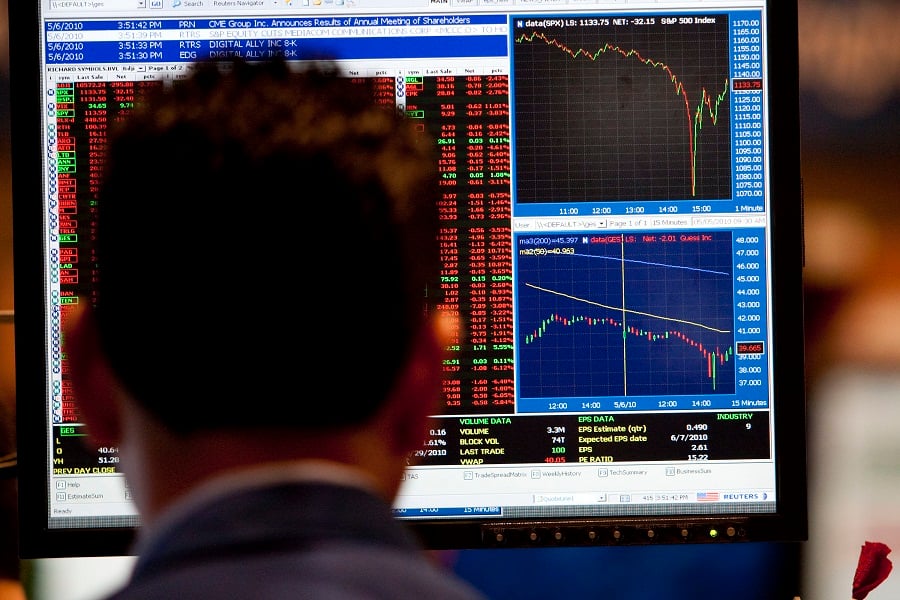American equities struggle to hold gain amid global share rise
The rebound in global equities sputtered in America, with the Dow Jones Industrial Average paring gains to 30 points as U.S. crude resumed a slide below $29 a barrel and bank profits did little to boost optimism about corporate balance sheets. Treasuries erased losses.
The Dow average fluctuated in afternoon trading after rising more than 180 points in the session's early minutes. The struggle in American equities came after European and emerging-market stocks pushed gains past 1.3% as data showed Chinese growth was in line with government targets. Copper led a metals rally, while Treasuries fluctuated with the yield on the 10-year note at 2.03%.
“You might get a bounce for today considering how severe the selloff was last week, but I don't think we've resolved all the issues in the market,” said Nick Sargen, who helps manage $46.2 billion as chief economist and senior investment adviser for Fort Washington Investment Advisors Inc. “The questions left are how much is China's economy in fact slowing down, and when will we see a floor for the price of oil.”
The renewed optimism over China boosted the MSCI All-Country World Index from its lowest level since July 2013 and bolstered commodity prices. While official figures showed Chinese growth slowed at the end of last year, the data weren't as dire as some investors had predicted and left the door open for authorities to do more to support the nation's transition to a consumer-led expansion.
Even with the rebound, market sentiment remains fragile, with a Bank of America Merrill Lynch gauge of volatility expectations for equities, bonds, currencies and commodities close to its highest level since October. Oil's renewed slide added to negativity as the International Energy Agency cut its 2016 estimates for global oil demand, while the International Monetary Fund cut its world growth outlook.
STOCKS
The S&P 500 rose 0.1% at 1:44 p.m. in New York. The index swung from gains of more than 1% to less than 0.1% as it sought direction following a holiday weekend. The index slid on Friday to the lowest level since Aug. 25, capping an 8% rout over two weeks in its worst start to a year on record.
Bank of America fell 1.5%, even as its results exceeded estimates. Apple Inc. lost 0.8% to weigh on technology shares. Crude prices remained an influence on fragile sentiment, with equity gains tracking today's fluctuations in oil.
European stocks snapped a three-day decline, rising for the first time since they entered a bear market last week. All 19 industry groups climbed, with commodity producers and energy companies leading gains.
EMERGING MARKETS
The MSCI Emerging Markets Index rose for the first time in four days, gaining 1.7%, the most in three months. Benchmarks in Russia and the Middle East climbed more than 2%.
Growth in China's industrial production, retail sales and fixed-asset investment all slowed at the end of the year, while gross domestic product rose 6.8% in the fourth quarter from a year earlier. The full-year expansion of 6.9%, the least since 1990, was in line with the government's target of about 7%, and higher than forecasts for as low as 6.5% in a Bloomberg survey of economists.
“The slowdown in China is nowhere near as bad as markets feared, plus officials have the ability to intervene and stimulate growth,” said Justin Urquhart Stewart, London-based co-founder of Seven Investment Management, which oversees about $13 billion of assets. “It looks like the hangover from this awful start to the year is finally clearing.”
The Shanghai Composite Index jumped 3.2%, the most since November, with Reorient Financial Markets Ltd. saying government-led funds may have entered to bolster the market. The Hang Seng China Enterprises Index of mainland stocks listed in Hong Kong jumped 3%, rebounding from a 2011 low.
CURRENCIES
The yen dropped 0.3% to 117.74 per dollar as investors unwound demand for the currency as a haven from turmoil in China. It has strengthened 1.9% this month.
South Africa's rand led gains in the currencies of commodity producing nations, rising for first time in three days. It strengthened 1.3% to 16.65 per dollar. Australia's currency gained 1% and Russia's ruble advanced 1%.
The pound declined to the lowest level since 2009 after Bank of England Governor Mark Carney signaled that an increase in interest rates is still some way off, citing slowing growth and the outlook for inflation. Sterling dropped as low as $1.4207.
COMMODITIES
The Bloomberg Commodity Index rose 0.6%, after closing at the lowest level since at least 1991 on Friday. Brent crude climbed 2.8% to $29.37 a barrel, paring its decline this year to 21%.
The International Energy Agency, adviser to 28 advanced economies, said Tuesday that global oil markets could “drown in oversupply,” sending prices even lower as demand growth slows and Iran revives exports.
Copper gained 1.6% as stock markets jumped in China, the world's biggest metals consumer. Former Federal Reserve Chair Ben Bernanke said China was making “good progress” with financial reforms.
BONDS
The U.S. 10-year note yield climbed two basis points to 2.05% amid speculation yields have gotten too low given the outlook for resilient U.S. growth. Yields on similar maturity German bunds rose two basis points to 0.55%.
“There's an unwinding of the flight to quality,” that's pushing Treasuries down, said Kazuaki Oh'E, head of fixed income at CIBC World Markets Japan Inc. in Tokyo. “I'd like to sell at this level. The U.S. economy should be basically OK.”







